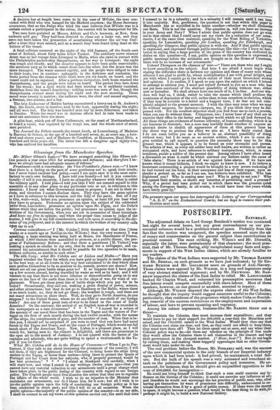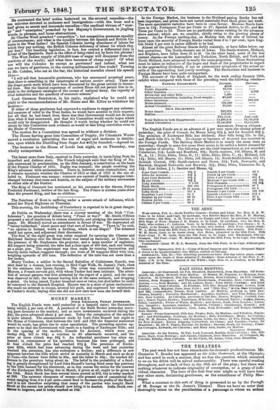POSTSCRIPT.
SATITEDAt.,
The adjourned debate on Lord George Bentinck's motion was continued last night for several hours, but any great encroachment on our pre- occupied columns would be a profitless waste of space. Probably from the fact that the motion was unopposed, the speeches assumed more the air of essays and commentaries on the general subject than contributions to practical counsel. The most striking, Mr. Wilson's and Mr. Disraelrs, especially the latter, were preeminently of that character; the most prac- tical, that of Mr. Thomas Baring, ably recapitulated many facts and argu- ments in support of the West Indian claims, which are already familiar to our readers.
The claims of the West Indians were supported by Mr. Titouss BARTNa and Mr. BERNAL, on such grounds as we have just indicated; by Sir ED- WARD BoxTox and Mr. GouLnuaw more on grounds of Anti-Slavery. Those claims were opposed by Mr. Wu.sow, in a long and ingenious essay of very abstract statistical argument; and by Mr. HEYWOOD. Mr. BAG-. anew supported the claims of the East Indies to relief. Mr. LABOUCHERE backed Sir Charles Wood, and reiterated his presumptive assurance that free-labour would compete successfully with slave-labour. Most of these speakers, however, on one ground or another, assented to inquiry.
Although Mr. WILSON disputed the express claims of the West Indies; he thought that the inquiry would suggest measures useful to the Colonies; particularly, that residence of the proprietors which makes Cuba so flourish- ing, removal of the onerous restrictions on the employment and importation. of labour, and laws to prevent squatting and vagrancy.
Among his calmer arguments, business-like Mr. BARING threw out a. threat—
To maintain the Colonies, they must increase their expenditure; and they would have to pay fur their support the 300,0001. a year that the Mauritius now raised, and the 790,0001. raised in the West Indies. Would they then say that the Colonies cost them too dear, and that, as they could not afford to keep them, they must tura them off? Then let them speak out at once, and say what their Colonial policy was to be—let them say whether on the principle of free trade they would allow the Colonies there to sell themselves in the dearest and buy their government in the cheapest market. (" Hear, hear!") But do not begin by ruining them, and making them beggarly appendages that no other Govern- meat would take under its care.
The real problem before-the House, Mr. DISRAELI said, was the success of the new commercial system in the only branch of our Imperial industry upon which it had been tried: it had proved, he maintained, a total fail- ure. But the bulk of his speech was a very animated and trenchant at- tack on the paltriness of the Government policy and measures. He an- nounced, for instance, that he should give an unqualified opposition to the vote of 200,0001. for immigration—
He could not bring himself to think that such a sum could exercise any in- fluence on the distress of the Colonies; it could not exercise any influence at all; and therefore he would not encourage the lax practice of public men, who, after having got themselves by want of prescience into difficulty, endeavoured to ex- tricate themselves from it by a grant of public money. If there were the money to spare, it might become a question what would be the best thing to do wtth,tt: perhaps it might be, to build a new National Gallery. He contrasted the brief notice bestowed on the avowed remedies—the ten minutes devoted to molasses and immigration—with the hour and a half given to secret and innuendo remedies—Me cardinal virtues of " ener- gy " and " enterprise," preached by her Majesty's Government, in jingling words, in phrases, and loose abstractions.
Sir Charles Wood preached " competition "; but competition presumes equality of circumstances; and what is the equality between the Spanish and British Co- lonies in the West Indies? the Spanish Colonies having abundance of labour for which they pay nothing, the British Colonies deficiency of labour fur which they pay dear? Our headlong legislation, in fact, has created a differential duty in favour of the Spaniards. Such is the effect of being ruled not by facts but phrases! The West Indian supply of 250,000 tons of sugar will disappear from the markets of the world; and what then becomes of cheap sugar? Of what use will the Colonies be except as garrisons? and indeed, what use can we have of garrisons, in the coming millennium of free trade? Turning to Mr. Cobden, who sat at the bar, the historical moralist closed his speech thus-
" I will tell that honourable gentleman, who has announced perpetual peace, that there is something in the catastrophe of nations armor arms. There are the longw path makes which have been denounced by the great satirist in immor- tal lines. But the limited experience of ancient Rome did not permit him to in• elude in the indignant catalogue of the causes of national decay, the rapacity of rival industries and the quackery of economic science."
Lord GEORGE BENTINCK, in his reply, explained why he could not yield to the recommendations of Mr. Hume and Mr. Ellice to withdraw his motion—
If either of those gentlemen had expressed a readiness to support any substan- tial measure of relief to the West Indies, he would have acceded to their request; but all that he had heard from them was that Government would not do more than what it had announced, and that his Committee would excite hopes which would only be disappointed. He thought it worth trying whether he could not obtain by this Committee such evidence as would at last bring conviction even to the House of Commons.
The motion for a Committee was agreed to without a division.
The House having gone into Committee of Supply, Sir CHARLES Wool) moved a resolution permitting the use of sugar and molasses in distille- ries, upon which the Distilling from Sugar Act will be founded.—Agreed to.
The business in the House of Lords last night, as on Thursday, was wholly unimportant.



























 Previous page
Previous page